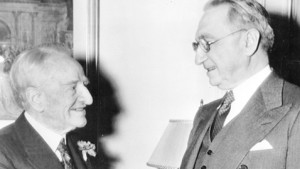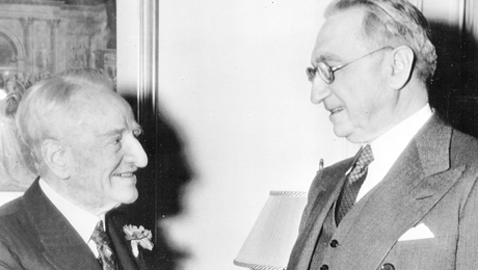
Virginia Senator Carter Glass (left) greets Georgia Senator Walter F. George. From the author’s personal collection.
Walter F. George was, during his time, one of the most respected and powerful members of the United States Senate. Senator George was a man of innate, if not somewhat exaggerated, dignity; even his wife, Miss Lucy, referred to him as “Senator George.”
George, like many of his contemporaries, was born on a farm in rural Georgia on January 29, 1878. The George family was one of modest means and Walter George worked to put himself through school, finally earning a law degree from Mercer University in 1901. George commenced the practice of his profession and he was sitting as a judge of the Court of Appeals for Georgia while still in his thirties. In 1917, he took his seat on the Georgia State Supreme Court and served until his resignation in 1922.
Walter George’s resignation from the Supreme Court was due to his interest in another office. United States Senator Tom Watson, a notorious populist rebel, had died in office, necessitating a special election. George determined to be a candidate for senator in that particular election. Georgia’s governor, Thomas Hardwick, a former senator himself, had his eye on the Senate seat and appointed the first woman to serve in the United States Senate on an interim basis. Hoping to influence the vote of women throughout Georgia, Governor Hardwick appointed Rebecca Felton to the vacancy. Hardwick had been opposed to the Nineteenth Amendment, giving women the right to vote and his appointment of Rebecca Latimer Felton was a none too subtle bid to restore his popularity with female voters. It was clear the appointment was little more than honorific, as Mrs. Felton was eighty-seven years old at the time. As Congress was not in session when she was first appointed, Mrs. Felton was not sworn into the Senate until after the election. Senator Felton was finally able to take the oath of office and served only for a day. Rebecca Felton remains the only woman ever to serve as a senator from Georgia.
Unfortunately for Governor Hardwick, his appointment of Mrs. Felton did not stave off defeat; Walter F. George won the Democratic nomination for the Senate seat and waited for a day before taking the oath to allow Rebecca Felton the honor of actually serving in the United States Senate.
Senator George remained in the Senate for virtually the remainder of his life, rising to prominence and power. George was reelected in 1926 and 1932 with little opposition. George steadily rose through the ranks of the Senate, gaining valuable seniority and served on both the Senate Finance and Foreign Relations Committees.
Walter F. George was closely affiliated with the business community of Georgia, especially Georgia Light and Power and Coca-Cola. While he had supported much of Franklin D. Roosevelt’s New Deal, his opposition to Roosevelt’s plan to enlarge the United States Supreme Court riled FDR beyond reason. An angry Franklin Roosevelt decided to purge his own Democratic Party of “reactionaries” in the 1938 primaries. Roosevelt was enormously popular in his Georgia, as it was his “adopted” home state and FDR”s cottage at Warm Springs, Georgia was well known. Roosevelt decided to use his personal popularity in Georgia to defeat Walter F. George.
Senator George was facing two opponents in the Democratic primary that year; Lawrence Camp, a former U. S. Attorney and the infamous Eugene Talmadge, the “Wild Man from Sugar Creek.” Talmadge was a very popular former governor and had run against Georgia’s other United States Senator, Richard Russell, two years previously. Talmadge was an avowed white supremacist (as were virtually all successful Georgia politicians at the time), a fierce opponent and critic of FDR and the New Deal. Talmadge was an accomplished campaigner and his stump appearances in his famous red galluses (or suspenders for those unfamiliar with the term) were legendary in Georgia. Clearly Franklin Roosevelt had no intention of supporting Gene Talmadge, who would certainly be far more objectionable to him politically than the stately, if insufficiently liberal, Walter George. FDR would back Lawrence Camp and boldly made the challenge to Senator George directly at an appearance in Barnesville, Georgia.
Franklin Roosevelt was uncharacteristically forthright in his attack upon Senator George, saying, “The senior Senator from this state cannot possibly, in my judgment, be classified as belonging to the liberal school of thought.” FDR went on to reinforce his point, but qualified it by larding it with a few, likely insincere, pleasantries about George personally.
“Let me make it clear he is, and I hope always will be, my personal friend. He is beyond question a gentleman and a scholar.” After the niceties, FDR dropped the hammer on the Georgia Senator: “I am impelled to make it clear on most public questions, he and I do not speak the same language.”
Then FDR gave out his own personal endorsement.
“I have no hesitation in saying that if I were able to vote in the September primaries in this state, I would most assuredly cast my vote for Lawrence Camp.”
Senator George rose and shook hands with the President who favored the Georgian with one of his trademark lopsided grins. Supposedly, Senator George told Roosevelt, “I regret you have taken this occasion to question my democracy,” but added, “I accept the challenge.”
Herman Talmadge, a governor and senator from Georgia himself, helped to manage his father’s campaign and in his autobiography recalled personally observing an incident that caused him to think the venerable Walter George would be easy to beat. George had very poor eyesight and naturally wore spectacles; Herman Talmadge witnessed a grizzled old farmer position himself to shake hands with George who didn’t even see the old gentleman. Yet both FDR and the Talmadges were in for a surprise. The George campaign was extremely well funded and Senator George used FDR’s interference to his own advantage. While Georgians loved Franklin Roosevelt, they deeply resented his attempting to defeat their senior senator for having disagreed with him. Walter George was not only reelected, but FDR’s preferred candidate, Lawrence Camp, ran well behind Eugene Talmadge. It was a profound political embarrassment to Roosevelt, the first of many such embarrassments in the various primaries FDR had favored candidates.
Senator George’s anger at having been targeted by FDR was summed up in a statement attributed to both him and South Carolina U. S. Senator Ellison D. Smith; when someone made the comment FDR was his own worst enemy, Walter George is supposed to have snapped, “Not while I am still alive!”
Oddly, had FDR been successful in purging Walter George, it would have deprived him of a valuable ally as World War II approached. George became Chairman of the Senate Foreign Relations Committee where the Georgian managed to get much of Roosevelt’s foreign policy passed and the committee was liberally populated with some of the Senate’s most powerful and eloquent isolationists. Walter George’s support for FDR’s foreign policy before and during World War II was a crucial factor in getting much of what Roosevelt wanted from the Congress, yet the war touched George and his wife in the most personal way. One of the two George sons was killed during the war. George’s surviving son, Heard F. George, became his father’s last Administrative Assistant.
George reluctantly surrendered the Chairmanship of the Foreign Relations Committee in 1941 to become Chair of the Senate’s Finance Committee. George remained Chairman of the Finance Committee from 1941 to 1955, save for four years when the Republicans were in the majority.
In 1955, Walter George once again exercised his option to chair the Senate’s Foreign Relations Committee. Despite being a Democrat, George was exceptionally supportive of Republican President Dwight D. Eisenhower’s foreign policy. George was one of the few members of the Senate truly respected by Eisenhower. George’s long service in the Senate and his preoccupation with America’s foreign policy counted for little as his 1956 reelection campaign loomed. George was being challenged by the son of his opponent in the 1938 campaign, Herman Talmadge. Cotton and peanut growers had little interest in foreign affairs and Talmadge was far more outspoken in his opposition to civil rights than the dignified Walter George. Senator George indicated he would be a candidate, but many of his past supporters seemed reluctant to back him again, especially many of the business interests that had funded his previous campaigns. George was seventy-eight years old and suffered from a heart condition.
Senator and Mrs. George were something of an institution in Washington, D. C. and Capitol society. Miss Lucy was very well liked by those who knew her and despite her husband’s formal bearing, she enjoyed telling and hearing risqué stories. Hoping to help Walter George stave off a challenge by Herman Talmadge, Henry Luce, publisher of TIME and LIFE magazines, had TIME publish a cover story on the Georgia senator.
After an initial start, Walter George soon decided he didn’t have the stamina to campaign all across Georgia in the punishing Peach State heat. He withdrew as a candidate and Herman Talmadge was elected in his stead. George intended to retire to his home in Vienna when an offer came from President Eisenhower. The Republican President asked George to serve as a senior foreign policy adviser and appointed the former Georgia senator as a special Ambassador to the North Atlantic Treaty Organization (NATO). George served only very briefly as his tenure was interrupted by a fatal heart attack on August 4, 1957.
Walter George was laid to rest in his home of Vienna, Georgia and was joined by Miss Lucy a few years later. The Mercer University School of Law is named for Walter F. George, as are several other things in Georgia. Unlike many of his political contemporaries from Georgia, Walter F. George was not known for crude appeals to racial hatred; George concentrated on legislation and taking care of his home state and by any measure Walter George was a productive member of the United States Senate.







